![07feature2-WTW-Addison[horiz] - Copy](https://chico.newsreview.com/wp-content/uploads/2023/01/07feature2-WTW-Addisonhoriz-Copy-678x381.jpg)
With pandemic restrictions and midterm election campaigns behind us, the year ahead feels a bit like a blank slate. What stories will the Chico News & Review tell, and who will be making the news, in 2023?
It’s always a good guess that our government officials will give us something to write about, and as is tradition for this annual Whom to Watch issue, we’ve singled out some newcomers—two Chico City Council members and a recently hired city manager—to feature as potential newsmakers.
We’re also looking at a young man with boots on the ground on the environmental activist front, as well as a couple of leaders from the Butte Democratic Party, which is regrouping in the wake of another disappointing showing at the polls for its local candidates.
Solo representative
Addison Winslow
Addison Winslow is unlike other Chico City Council members—those with whom he’s serving, perhaps any who have served. First, there’s his age, 27, making him the youngest Chicoan elected to the council in two decades. His city stipend pays his rent; his city health insurance opens the door to primary care, dental care and vision. He’s a representation of many Chicoans—those who are figuring out their careers, renting their housing and trying to secure healthcare.
On the dais, Winslow is the solitary progressive among six conservatives. As such, he sees himself representing not only his District 4 constituents but also other like-minded citizens citywide. The long-time advocate for tenants’ rights, affordable housing, strong neighborhoods and environmental sustainability hoped to have company with fellow progressive Monica McDaniel, who led early returns for District 3; however, Dale Bennett, the appointed incumbent, wound up securing that seat.
“I’ve gone through seven stages since election night,” Winslow told the CN&R the day before assuming office at the Dec. 6 meeting. “A big difference in my expectations for the future was based on [McDaniel] being on the council. Her not being on the council meant I needed to rethink what my role in the next two to four years would be, which was difficult, emotional, stressful.”
A trip to Eureka and Arcata, as well as biking around Chico to fully explore neighborhoods beyond his district, crystallized his thinking. Winslow takes the baton from Alex Brown, the only progressive on the previous council, who questioned her colleagues and pushed her positions. Along with that, a role he describes as a “liaison of information,” he plans to advocate directly.
“Alex has been a good mentor and friend—who can sympathize more?” Winslow said, chuckling. “I really, really respect and admire what Alex has been able to do as a lone voice on the council, and I intend to import some of those strategies.
“But I also think that we’re lacking in a lot in elements of community organization in town. That has an impact on the election, for sure, but also Chico as a whole … and I’m looking in many respects to step up the degree of community organization that we have so it’s not just me representing these things, I’m also able to carry forward more organized voices from the public.
“I see myself as [the late] Guillermo [Mash] put it: a community advocate over a politician. I’m filling the role of a politician. That gives me a platform to express views that are shared by what would frequently be a majority of the city, even though I’m the only voice [on the council] to express it.”
Focal points for Winslow include the sanctioned campground proposed by the North State Shelter Team; the proposed Valley’s Edge development; newly mandated revisions to the city’s housing element; infrastructure projects; and the city budget, particularly how to allocate the additional revenue generated by the 1 percent sales tax increase approved in the election.
“I have to be careful in ways that I didn’t necessarily anticipate—or I’m told I do—to toe a line between being part of community organizing efforts outside of the City Council chambers and holding my role in the City Council chambers,” he said. “I’ll have to figure out the balance; maybe experiment there, maybe get reprimanded for speaking too strongly on some things.
“But I was not elected to quietly make decisions without exercising my principles.”
—Evan Tuchinsky
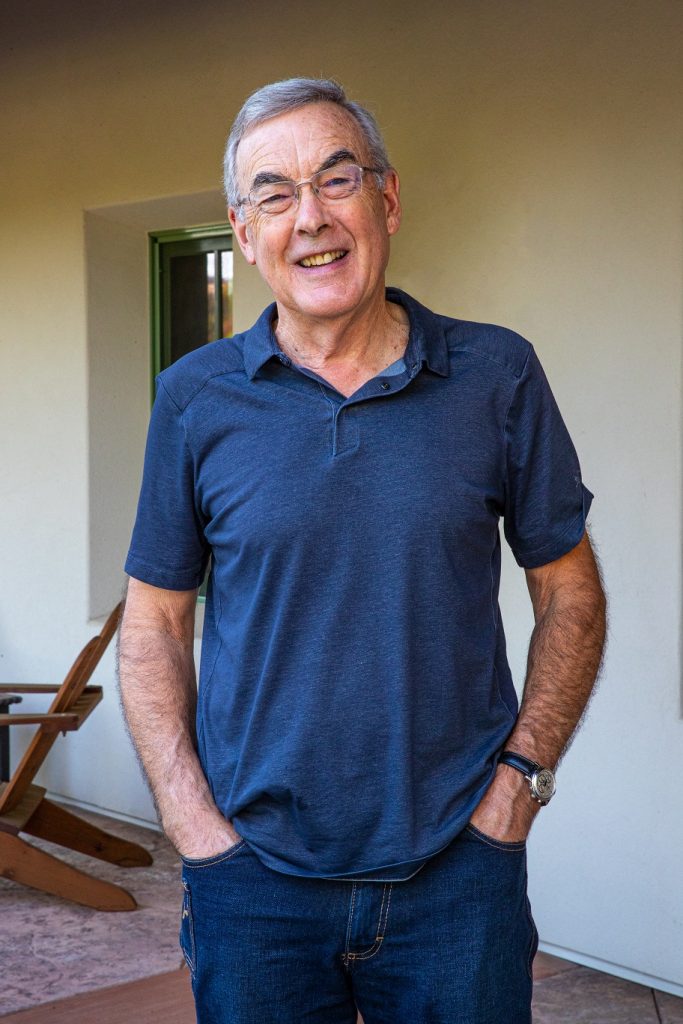
Return to Mayberry?
Tom van Overbeek
During his campaign for the District 6 City Council seat, Tom van Overbeek ran on a very straightforward platform: Improve the quality of life in Chico.
“The reason you move to a small town is so that you have this sense of community and safety, and your kids can go downtown and you don’t have to worry about it,” he said during a recent interview. “We lost that because of homeless people camped everywhere.”
Van Overbeek grew up in Modesto, lived in the Bay Area and worked as an executive in the computer and communications industries for 30 years. In 2017, he moved to Chico with his wife, Kim Hawley, but he had been connected to the area for much longer. His son attended Chico State; he owned a Chico home and lived here part-time for 10 years; and for the past couple of decades-plus he has had a hand in shaping the character of the city, mostly as a developer/owner of commercial properties.
In recent years, van Overbeek said, the impact of homelessness on the city has obscured the small-town image he had of Chico (which isn’t so small anymore, having doubled in population to more than 100,000 in the past 25 years), and during door-to-door visits, he found constituents from all political walks of life who felt the same.
“I heard two things very clearly, consistently: ‘We want to get our town back; we don’t want homeless people camped in our public spaces’”—but, he added, they wanted to achieve this in a humane way.
The policy areas he intends to focus on involve attempting to reclaim public spaces from the remaining homeless encampments (which grew during the COVID pandemic due to lack of available emergency shelter space), in addition to enhancing public safety and building housing.
Van Overbeek underlined two immediate action items. The first is to continue to meet the terms of the Warren v City of Chico settlement—providing emergency shelter for unhoused Chicoans and following the strictures for keeping them from camping in public spaces. The second is to determine how to spend funds generated by the recently passed 1 percent local sales tax increase, which is projected to generate an additional $24 million per year pledged for street maintenance, homelessness solutions, police, firefighters, parks and other general services
“[We] have this pot of money from Measure H,” he said, “How do we allocate it?”
Though Van Overbeek expressed support for the range of spending priorities, he first mentioned hiring more police. He pointed out that Chico currently employs 0.9 sworn officers per 1,000 population. The national average for a city Chico’s size is 1.6 per 1,000.
Unapologetically conservative, van Overbeek is critical of social programs he views as contributing to homelessness and restrictive environmental policies he sees as causing housing shortages—and he finds fundamental oppositional differences between Republican and Democrat approaches to both.
On the City Council level, though, despite a 6-1 conservative majority, he said local moderates and liberals might be pleasantly surprised by how some issues are addressed in the coming year. He and the lone progressive on council, fellow newcomer Addison Winslow, already click on one topic: making Chico more pedestrian friendly.
“We have very similar ideas about what should happen downtown,” van Overbeek suggested. “I don’t want a trolly… but traffic-calming, way-finding signs … there’s support [on council] for those.”
—Jason Cassidy
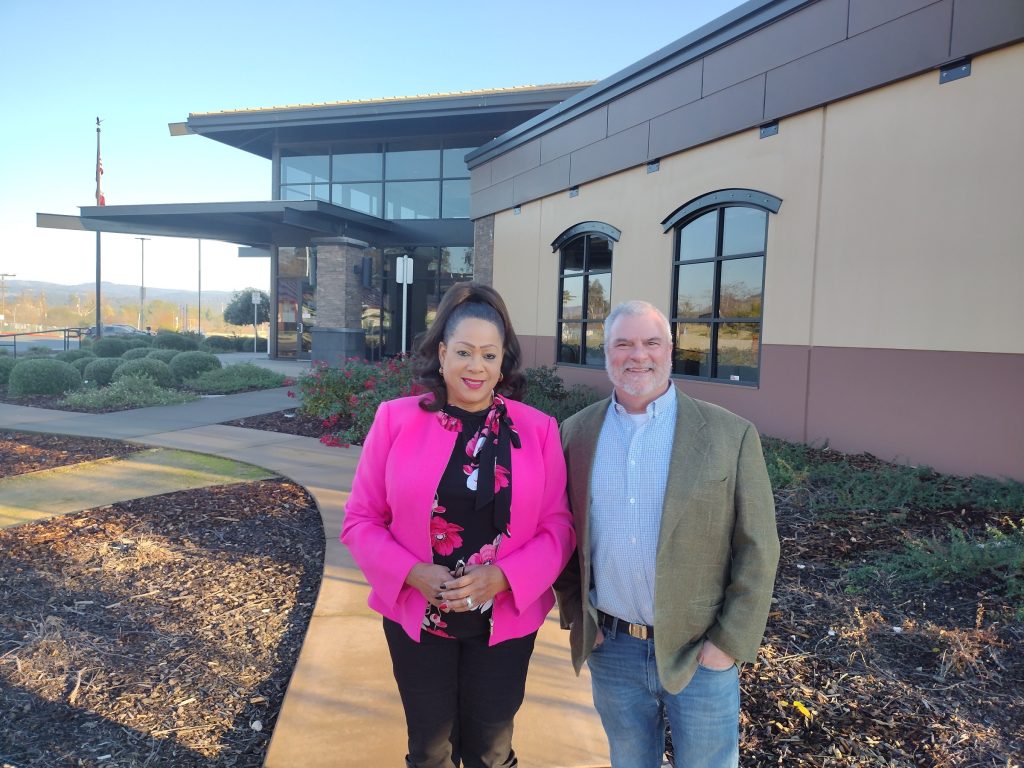
‘JEDI’ Democrats
Rich Ober and Janet Goodson
There is no sugar-coating it: Democrats are not doing well in Butte County. In 2022, they lost big. During the primaries, they gave up one seat on the Board of Supervisors—and, with it, the ability to force concessions on matters requiring a fourth-fifths vote. Similarly, during the general election, only one progressive made it to the Chico City Council, keeping the conservative advantage at 6-1. The council has now swung right four out of the last five cycles.
Redistricting played a part in some of the results, most notably the drastic alteration of Butte County Supervisorial District 2, which reduced the once-heavy advantage of registered Democrats to a nearly 50/50 split, giving Chico police officer Peter Durfee the opening to knock off incumbent Debra Lucero.
Like it or not, the new districts are the reality for the next decade, and if Democrats hope to have success with gaining local offices, they have a lot of work to do.
As the current local leadership, Butte County Democratic Party Chair Rich Ober and Vice Chair Janet Goodson are already planning for the next election—and they are drawing some inspiration, and hope for a way forward, from one of the bright spots of the last cycle.
“I think Addison Winslow’s campaign was full of energy,” said Ober, referring to the 27-year-old progressive newcomer who won the District 4 seat on the Chico City Council. “He did bring kind of a new set of voters to the table. He had an in incredibly solid on-the-ground game plan.”
One of the key strategies of the local Democrats is to attract those “new” voters as well as new candidates—both young people in general (such as Winslow), as well as members of underrepresented communities—who share the foundational Democratic values of economic justice, smart growth, protecting water, addressing climate change, equality, affordable housing, etc.
Goodson, an Oroville City Councilwoman who leads the local NAACP chapter, is particularly focused on the party’s Justice, Equity, Diversity and Inclusion (JEDI) goals and sees partnering with like-minded organizations, from local nonprofits to national organizations, as a key avenue to explore.
“We’re working really hard to change the face of the party,” she said.
Both Goodson and Ober have personal experience in campaigning from the vantage point of a candidate. Goodson twice won City Council seats and has served as Oroville’s vice mayor. Ober, a community organizer and communications director/consultant, lost two bids for Chico City Council and said, in joining party leadership, “I felt that there was a perspective I would bring to the party from that unique position.”
In addition to the usual party promotion—communicating issues, inspiring current voters and registering new ones—Ober said some of the most crucial work that needs to be done is preparing infrastructure needed to run successful campaigns. Potential candidates shouldn’t have to spend much time trying figure out all the ins-and-outs. The party should support the candidates so they “can hit the ground running.”
—Jason Cassidy
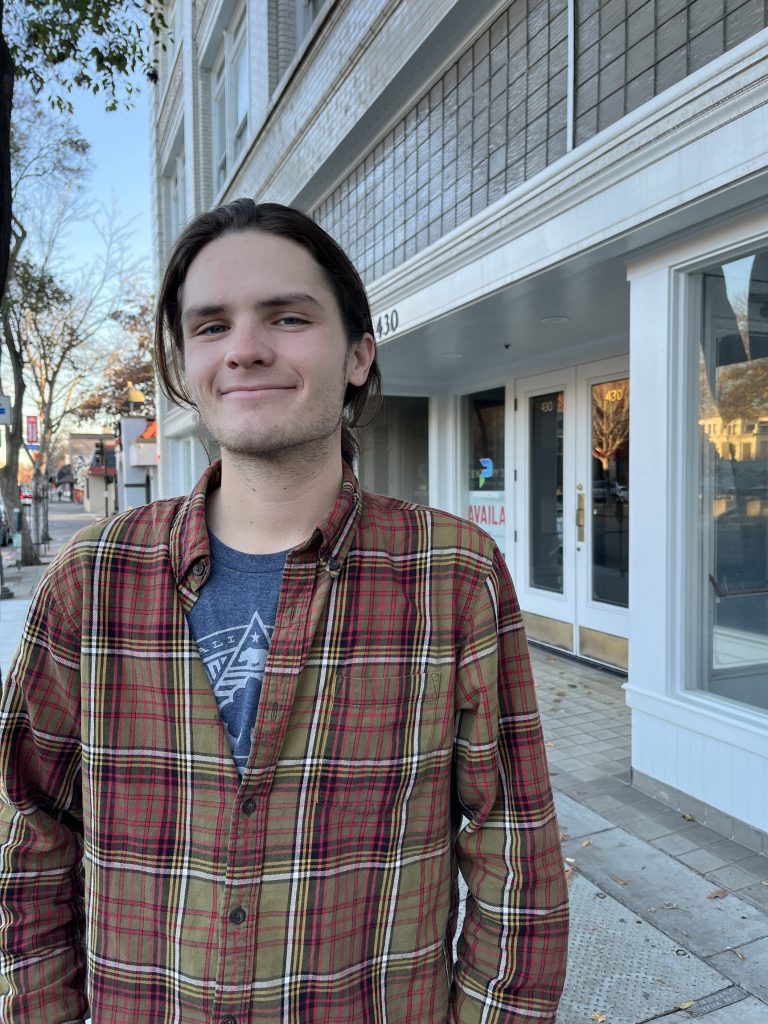
Next-gen eco-warrior
Jared Geiser
Be More Like Bill (#beemorelikebill). That phrase has been circulating among local progressives of late, both as a token of respect for the recently passed Bill “Guillermo” Mash and a mantra for those inspired by his tireless work and infectious good will.
Among the many Mash positively affected is Jared Geiser, a young environmental and political activist. Geiser met his late friend, neighbor and mentor while organizing climate actions and education at Chico State in 2017.
“Guillermo was all about progressive change,” Geiser said, “getting roofs over peoples’ heads, falling in line with environmental realities, creating a world where people are more friendly and connected and supported and no one is left behind. He helped instill that in me.”
Geiser, 24, is a life-long local who went to Pleasant Valley High School and engaged in service projects as a Boy Scout. He leaned toward progressive politics as a teenager and cites attending a 2016 Bernie Sanders rally in Sacramento as a formative moment. (“There was more than 20,000 people there, and I was just blown away,” he said.)
Geiser started his Chico State studies majoring in construction management. However, he said, “after taking an environmental science class, I started to become deeply concerned about our future, in regards to things like climate change, resource depletion and biodiversity loss. So I changed my major to something more relevant to those concerns.” He shifted focus to geography and planning/environmental studies, graduating in 2020.
After college, he worked doing conservation planning with farmers and ranchers, and Geiser currently serves as project coordinator for Altacal Audubon Society, the local chapter of the National Audubon Society. He organizes educational efforts ranging from Bird Storytime events at regional libraries to speaking at high schools about how development can negatively impact ecosystems.
Land use is one of his primary concerns, both with Altacal and in his personal efforts. He stood against the Stonegate neighborhood project and is currently focused on opposing the Valley’s Edge development.
“[Valley’s Edge] will destroy critical habitats for a lot of sensitive species, many of which have already seen huge population declines from habitat loss,” he said. “There are at least 10 bird species of concern at that site.”
Though the city’s Planning Commission voted 5-2 on Dec. 1 to approve Valley’s Edge, Geiser said the project still has a long way to go. The conservative-majority City Council was scheduled to hold a hearing on the project on Jan. 3 (after the CN&R went to press). If approved by the developer-friendly council, Valley’s Edge will face legal challenges from environmental groups.
Geiser said he regularly visits Verbena Fields to study Traditional Ecological Knowledge (TEK) and plans to host some food sovereignty workshops focused on dehydrating, canning and pickling food at the South Chico Community Assistance Center. He also has guest-hosted the “Ecotopia” program on KZFR (90.1 FM) and is completing his training to become a programmer there—following in the footsteps of his mentor, Mash.
“Guillermo showed us how to make a big impact and be happy,” Geiser said. “He lived simply, and he led a great and honorable life.”
—Ken Smith
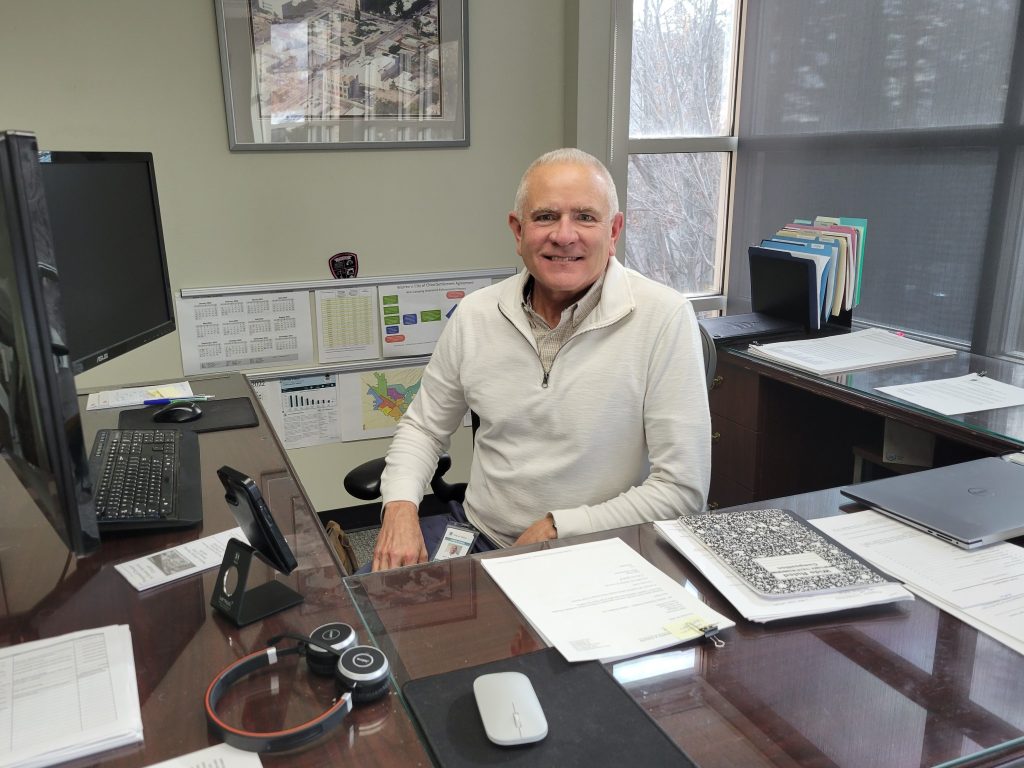
Familiar face, new place
Mark Sorensen
During his time on Chico’s Planning Commission and City Council, Mark Sorensen worked with six city managers, from Fred Davis to Mark Orme. Now, he is the city manager, having replaced Orme in July.
Sorensen came in at full speed and fully up to speed with “a lot of advice—solicited and not solicited,” he said, laughing. He’s made a number of changes, but few that the general public would notice; mostly, adjusting internal processes with the aim of streamlining how the 435 city employees work. He told the CN&R he doesn’t plan on any major reorganization of departments or any major personnel shifts.
“I’m more of an incrementalist—that’s always been my M.O.,” Sorensen said. “Constant, small, incremental change, as opposed to big ones.”
The Community Development Department now accepts building plans electronically, not just paper copies. Likewise, city managers can approve documents via electronic signature. City Hall is in the midst of revamping storage of public records; in fact, as the CN&R met with Sorensen last month, a construction team was remodeling a space outside his office to relocate city attorney files.
“We moved several things around on the third floor to get better efficiency, better use of the space,” he said. Hearing hammering outside his door, he added: “Yup, that’s a sign of progress.”
An engineer who owned a satellite communications business when first elected to the City Council in 2010, Sorensen spent 10 years as city administrator of Biggs. He served two council terms, including as mayor and as vice mayor, during which his predecessor was hired. Orme recently became city manager of Eastvale in Southern California.
“I came into this job with a lot of knowledge of the city already,” Sorensen said. “I think I was in very good shape on that front, so no real surprises. My job now is getting stuff done, a lot of making the operations smoother, more effective, more efficient.”
His “radar screen” for the coming year has no overriding issue in the way homelessness dominated the preceding years. Rather, he continued, he’s tracking “lots of seemingly small details that add up to being significant.” The biggest action item is the city budget for next fiscal year, which will include a $24 million injection of revenue from the voter-approved 1 percent sales tax increase.
“A lot of good stuff [is] going on in the city right now,” Sorensen said. “With Measure H passing, I think folks will be very impressed with our ability to deploy those funds in noticeable ways.”
—Evan Tuchinsky

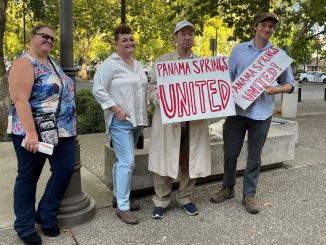

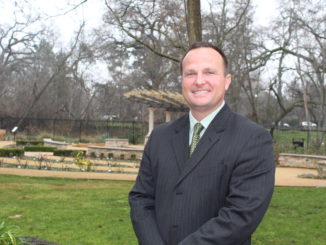
Bravo for this boots-on-the-ground journalistic coverage of some current local “citizens of influence”